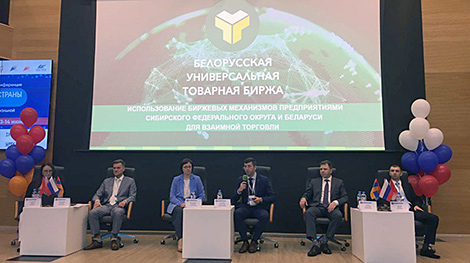Business news
BUCE to promote exchange trade in EAEU

MINSK, 14 June (BelTA) - Belarusian Universal Commodity Exchange (BUCE) plans to make its contribution to creating favorable conditions for the development of cross-border electronic commerce within the Eurasian Economic Union (EAEU) by further integrating the exchange mechanism into supply chains and facilitating mutual access of economic entities to the markets of the EAEU countries, Head of Foreign Economic Relations at BUCE Aleksandr Bashliy said at the international conference “Export to the EAEU countries. Scenarios of interregional cooperation” which took place in Novosibirsk, Russia on 13-14 June, BelTA learned from the BUCE press service.
According to Aleksandr Bashliy, residents of all EAEU countries are accredited with and work on the exchange platform, with companies from Russia and Kazakhstan being the most active users of BUCE. “Today, we have 3,852 accredited business entities from Russia, 113 from Kazakhstan, 25 from Kyrgyzstan and 24 from Armenia. Of course, not all of these companies make regular transactions. The share of active bidders is about 45% on average. We try to maintain constant contact with our clients, inform them about interesting lots and new commodity positions. This brings a positive effect. In January-May 2024, the amount of exchange contracts concluded by residents of the EAEU countries increased 3.7 times. Russian and Kazakh businesses were particularly active in using the exchange platform. In value terms, they accounted for over 90% of Belarus’ exchange trade with other EAEU states,” the head of foreign economic relations at BUCE said.
Talking about BUCE's experience in organizing interregional exchange trade, Aleksandr Bashliy cited an example of using the platform for industrial and consumer goods by Russian companies when purchasing and selling import-substituting products. “For almost two years our B2B platform for trade in industrial and consumer goods has been using an electronic service that helps to buy, sell and place orders for the manufacture of import-substituting products. This tool is in demand among both Belarusian and Russian companies. Through our platform they promptly find suppliers and consumers of import-substituting goods in Belarus, as well as conclude transit deals with counterparties from other regions of the Russian Federation. Since the beginning of the year, Russian participants of the exchange trading have already imported $5.4 million worth of industrial and consumer products,” Aleksandr Bashliy said.
As part of the business program of the conference, the BUCE delegation held negotiations on cooperation with representatives of a number of production and trade organizations from Irkutsk, Kemerovo, and Novosibirsk regions. The focus was on supplies of Belarusian dairy products, amino acids and premixes to these regions, as well as imports of oilseeds, veterinary drugs, mixed fodder, polymer packaging and production equipment for the Belarusian agricultural sector.







 print version
print version make home page
make home page add to bookmarks
add to bookmarks

